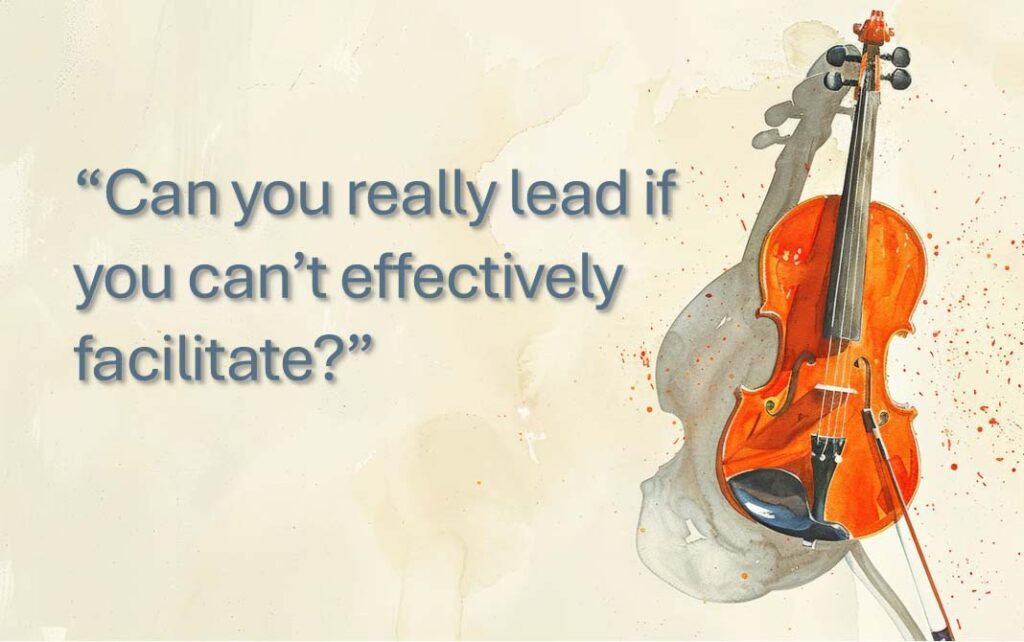Here’s an exercise workshop participants complete. Follow along, you leaders who have never chosen to take a facilitation class.
Grab a sheet of paper. Any kind will do, even your iPad if you can write with your iPen. But participants complete this exercise in handwriting. No typing.
Draw a vertical line down the center of your paper to create two equal columns. Label the left column “Facilitator,” and the right column “Leader.”
Focusing only on the left column, list your responses to the question, “What are the key responsibilities of a facilitator in a meeting?” List as many as you can think of.
Now repeat the writing exercise for the right column but answer the question, “What are the key responsibilities of a leader in a meeting?”
I’ve conducted this exercise for over 25 years at the start of my Advanced Facilitation Workshop. After giving the participants time to write down their thoughts, I move around the room clockwise, asking participants to read what they have written—first for the facilitator and then for the leader. As they do so, I capture their responses on a whiteboard.
While capturing the responses, I often hear comments such as, “Oh, wow, my thought is way off.”
At that point, I reply, “That’s okay. Read it anyway.”
Another participant might note, “That’s what I had written down for a leader, not a facilitator!” To that, I say something like, “No issue. Hold onto that thought and when we’re done capturing this side, I’ll add yours to the leader column.”
This process takes five to seven minutes. When When I have captured all the responses, I ask, “Which items appear in both columns?” and then, “What percentage of items appear in both columns?
In my workshops, the percentages of qualities that show up in both columns run around 60–80 percent. Many participants even say that they saw no difference between the two roles, save for who ultimately owned the decision.
And thus, my puzzle:
Why don’t more leaders sign up for facilitation workshops to further develop their leadership skills?
The majority of an organization’s work takes place in meetings. Why the choice to not become proficient in the skills that significantly improve the outcome of those meetings?
I lay blame on the late 1980s to early 1990s’ obsession with facilitators trained in Six Sigma, information management, project management, or team building. As one colleague noted, many companies “trained a cadre of non-leaders in facilitation skills, with these people being given the task of facilitating important meetings, with their role being described as a supporting role for the leader that owns the issue(s) being worked. That results in leaders who consider learning facilitation skills beneath them.”
Most participants see not only the commonality but also frequently note in their end-of-class feedback, “My manager needs to take this” or “Every leader needs to take this.”
“When leaders start to use facilitation techniques to manage their meetings, they will soon discover that facilitation is actually not a “touchy-feely,” nice to have frill but an essential tool for bringing much needed structure to their work with their people.”
– Ingrid Bens
One colleague insightfully asked, “Can you really even lead if you can’t effectively facilitate?” Another leader noted, “[The workshop] developed questioning and communication skills that opened deeper conversations, stronger partnerships, and shared commitment to action. The training made me realize that we spend most of our lives communicating—except nobody teaches us how.”
My workshop participants aren’t the only ones who have noticed this. A 2019 Harvard Business Review article noted, “Fifty percent of senior leaders believe that their talent development efforts don’t adequately build critical skills. Traditional providers bring deep expertise in teaching cognitive skills, but they are far less experienced in teaching people how to communicate and work with one another effectively.”
A Forbes article titled “Facilitation Skills Just Might Be the Best Kept Leadership Secret” noted “leaders are inundated with skills they’re supposed to master, but most of those focus on what they want to achieve. The magic of facilitation skills is that they focus on how to achieve those desired goals in a very practical way.”
Skills such as structuring and executing effective decision-making conversations, asking better questions that help a team more deeply understand opportunities and challenges, and reading and redirecting the group dynamics that interfere with building engagement and alignment lie not only in the realm of facilitation but also are critical for every leader.
These facilitation skills are essential tools for getting work done.
In 2024, after spending almost 30 years trying to overcome the term facilitation, I rebranded my workshop as a leadership workshop. A comment from this class: “This is the best leadership workshop I have ever taken.”
P.S.
Want to get a glimpse into the world of process skills? Click here to read the Appendix to gain insight into why I used the techniques I did, and the science behind those techniques.

